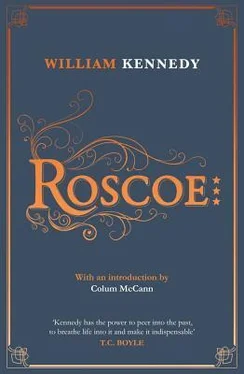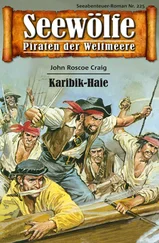“Elisha and I aren’t talking,” Ariel said.
Ariel on the pier was a handsome, salient figure in blue blazer and white slacks, pencil-line mustache, a preposterously large ruby on his left ring finger, and a full head of pure white hair. He did not look his sixty-eight years, and he exuded a sense of mature dignity that was wholly unearned. Ever since Elisha relieved him of power at the steel mill, he had been in perpetual motion between Albany, Manhattan, Miami, Saratoga, and the pleasure domes of Europe, never alone, devoting all his days to the hedonistic carnival his life, in late years, had become. Now, as his servants unloaded everyone’s luggage, Ariel introduced Roscoe and Pamela to his traveling companions as they came down the ramp: Lamar Kensington, the insurance executive who backed the Broadway musical with him, Encore, Maestro, a hit that renewed Ariel’s exchequer after he left the mill; three Broadway dancers, Billie, Lillie, and Dolly, from another Ariel-Lamar show that had just flopped; two judges from downstate whom Ariel introduced only as Jerry and Ted; Ariel’s chauffeur, Griggs; his personal chef, Philippe; and, last off the boat, his physician, Roy Warner, and Warner’s bosomy wife, Estelle. Ariel saw or talked with Warner every day of his life to combat the shifting pains, maladies, and other multifarious disguises that death assumed in its never-ending pursuit of Ariel’s ailing soul and body.
“Oh, Dr. Warner,” Pamela said when she saw him, “thank heaven you’re here. You don’t know the pain I’ve been in.”
“She’s been suffering since yesterday,” Roscoe said to Warner.
Dr. Warner, an affable, jowly man in his forties, with large ears and a perfect bedside smile, shook hands with Pamela. “Your stomach acting up again?” he asked.
“It gets better, then it comes back.”
“Do you have the pills I gave you?”
“Gone. But I haven’t needed them for weeks.”
“I’ll get you some when we settle in and I find my bags.”
“You’ll join us for lunch, and late dinner,” Ariel said. “We have a continuing feast, you know.”
“Of course,” said Roscoe, who was already making plans to leave.
Half an hour later, Roscoe had escorted Pamela to the Warners’ cottage and was walking with Ariel, both of them coatless under the ardent July sun. They were nearing the Swiss cottage, the most elegant of the secondary buildings, built to match the main lodge, with twisted cedar and shaggy spruce. On the sloping lawn in front of it, Billie, Lillie, and Dolly were sunbathing on the grass, all supine and naked under small lap-towels.
“Excessively lush, the scenery at Tristano,” Ariel said, and he waved to the women. They all waved back and Billie removed her towel.
“And it changes radically from minute to minute,” Roscoe said.
“You hardly need anything along these lines at the moment, Roscoe, but you should know that these young women are very friendly.”
“But I have a very friendly bride.”
“You also have a reputation for diversity, and it’s a comfort to have excess on hand for emergencies.”
“I can’t imagine one arising,” Roscoe said. “Which of those excessive creatures belongs to you?”
“Oh, that’s not how it’s done. We have no ownership here.”
“Sweet land of liberty. E pluribus unum ?”
“There you have it.”
Ariel’s sexual excesses distanced many, but they amused Roscoe. Since childhood he had developed a friendship with Ariel that was familial. It had been painful to watch him squander his money and weaken the steel mill as he became a full-time satyr. But the dream assumes curious shapes.
“I suppose you miss the mill,” Roscoe said.
“Not at all,” said Ariel. “I gave it all I had. Now I’m doing the same for myself.”
“I grieve over the trouble between you and Elisha,” Roscoe said. “The war between fathers and sons is unwinnable and usually a self-mutilating pursuit. And Tivoli isn’t the same without you around.”
“Ah, you grew up well, Roscoe, and you have the gift of talk. I thought you’d rise in political office like your father.”
“I wasn’t cut out for public life.”
“We never know what we’re cut out for. Who could have predicted I’d swap my stable of horses for a stable of women?”
“Some might consider that an improvement.”
“As do I, on those days when I don’t think I’m dying.”
“Psychic sex as an antidote to psychic illness. Are you dying now?”
“Not at the moment. But the day is young.”
“We won’t clutter your demise,” Roscoe said. “We’ll get out of your way by morning.”
“Don’t be in a hurry. There’s always room for two more at Tristano. Too many is just enough. And the time allotted for frolic runs out, Roscoe. Take my word.”
Estelle Warner was alone on the porch of the main lodge, drinking what looked like gin, when Ariel and Roscoe settled into green rocking chairs. Lee, an Oriental servant, appeared at their elbows as they arrived, asking whether he might bring drinks. Whiskey and whiskey, the two men said, and Lee vanished into the lodge.
“Did you have a nice walk, Ari?” Estelle asked.
“We did. The girls are taking the sun.”
“I thought of doing that myself,” Estelle said, “but it’s a bit too high in the sky for me. I’ll get the freckles in odd places.”
“Nothing wrong with freckles in odd places,” Ariel said.
“You like the odd places,” Estelle said.
Estelle smiled at Roscoe, revealing a set of teeth so egregiously false they neutralized all meaning in her smile. Her manner, like her bosom, was ebullient.
“Are you waiting for the doctor?” Roscoe asked her.
“He’s having a session with his patient.”
“Pamela, you mean.”
“Oh yes, Pamela. They do drag it out.”
“I know,” Roscoe said. “I’ve taken her to his office.”
“She takes you with her, does she? He’s had her in hand since she was fifteen. He’s brought her along.”
“Oh yes? How do you mean that?”
“He’s taught her how it’s done. Roy does love the little chickadees.”
“Estelle, Roscoe and Pamela are married.”
“Married, are you? How cozy! You and I should have a matching consultation. We could have it right now, right here on facing chairs. The servants would never intrude, and Ari could cheer us on. You know, I’d wager that Roy is re adjusting her pelvis even as we speak.”
“They’re on their honeymoon, Estelle.”
“Honeymoon! Oh, that is very spicy, and the doctor having a house call from the bride.”
Roscoe remembered Pamela’s face that day when she walked up the steps of the porch with Dr. Warner. It was a half-smile, a mask of relief at the presumable banishing of pain, the restoration of light to her dark condition, but also, in her cheeks and lips, the flush of gratification that Roscoe knew well. The force of the doctor’s jaw, his parsimonious grin, expressed quiet triumph.
“Walk me back to the room, Roscoe,” Pamela said. “I still feel lightheaded. I need to lie down.”
As they left the porch, Roscoe decided that none of what Estelle had suggested was true, that it was Tristano imposing its aura of fantasia. In their room Pamela opened her body to Roscoe with such fervid immediacy that he understood, even if he could not confirm, that it was not Tristano’s fantasia but the experience of receiving a second lover within a quarter-hour of the first that was driving Pamela’s ecstasy; that this arose not from either act of love but from their whor ish succession. Roscoe then realized this had been the pattern of their love since he first came to know it, that hers was no more related to him than his was to her, that they were both artful stylists enacting a loveless ritual that had no meaning beyond the orgasmic. Meaning would destroy the ecstasy. Roscoe now thought of it as loathsome pleasure, consummated by mutual traitors. Life without betrayal is not life.
Читать дальше












